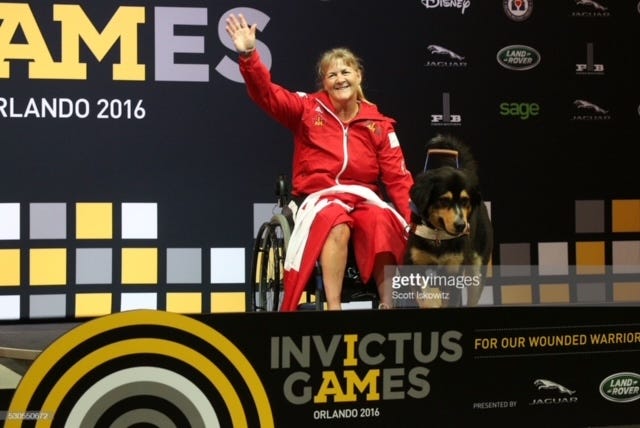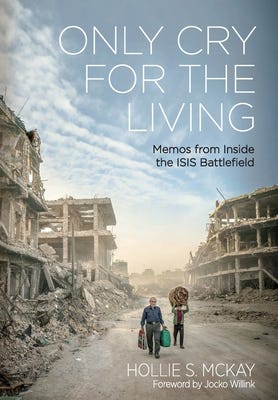Veterans Affairs Canada under fire for offering struggling veterans assisted suicide rather than fixing the root of their problems
includes interview video
This article discusses suicide. If you are in crisis or think you may have an emergency, call your doctor or 911 immediately. If you're having suicidal thoughts, call 1-800-273-TALK (8255) to talk to a skilled, trained counselor at a crisis center in your area at any time (National Suicide Prevention Lifeline). If you are located outside the United States, call your local emergency line immediately.
Christine Gauthier trembles as she speaks. For the 52-year-old Canadian veteran, every moment is a challenge. When she detailed her deteriorating condition over the phone, a representative from Veterans Affairs Canada (VAC) offered the option of medically assisted suicide or medical assistance in dying (MAID), rather than offering the assistance she needed to quell the suffering.
“I was completely shocked,” Christine tells me, her voice cracking with emotion, recalling her jarring VAC phone call in 2021. “I was having a conversation stating I was really depressed because of what I have been through in the last five years. I couldn’t believe it.”
In addition to feeling depressed and discouraged before the call, Christine remembers how the MAID’s offer only exacerbated her bitter torment.
“I remember feeling like I could not believe this. You won’t give me the equipment I need to live, but will let me die,” she underscores. “It was surreal. It was unreal. I was completely disgusted.”
Christine spent ten years as an artillery expert and deployed to Israel during the Gulf War. Then in 1989, her world came crashing down after jumping into a deep hole amid obstacle course training – a fateful jump that led to severe and irreversible damage to her knees and spine.
“I sustained tiny fractures in my spine that were overlooked. And then as my condition continued to deteriorate, they started realizing (much more) degeneration in my spine,” Christine tells me tearfully. “I had surgery in 2013 and 2019. At the same time, I am constantly overusing my arms and had shoulder surgery in 2017. I have some major depression.”
After retirement and refusing to suspend her athletic ambitions, the former corporal competed as a para-canoeist at the 2016 Paralympics in Rio De Janeiro and the 2016 Invictus Games. Now engulfed by frustration and physical agony, Christine has been trying to have the VA install a wheelchair ramp in her Quebec home for five years.
“Since 2017 – I have been waiting for a transfer of equipment, an elevator in my house, replacement equipment and a wheelchair. It has been five years, and it hasn’t gone any further. I don’t have an elevator,” she continues. “It is completely discouraging.”
Christine dejectedly shows me the letters she sent to Prime Minister Trudeau and Veterans Affairs Minister Lawrence MacAulay.
Unfortunately, Christine’s case is not an anomaly.
Canada’s Veterans Affairs acknowledged four known incidences of MAID being presented to veterans between 2019 and 2022, and claims they were all “related to one employee,” stressing that this is not “a widespread or systematic issue.” Christine’s encounter is not among the confirmed cases, but remains under investigation.
However, Mark Meincke, a Canada-based veterans health advocate and creator of the podcast Operation Tango Romeo (OTR), knows of at least five caseworkers who have proposed MAID to struggling veterans and at least one veteran who has gone through with the procedure. He is steadfast in finding out if and when this became policy in the VA, or if some form of memo alerted case officers that it could be extended to the veteran community.
“Right now, the government is doing everything it can to try to bury it and minimize it to avoid telling the ugly truth,” Mark says. “But I haven’t stopped pushing. So, as I keep pushing, I keep getting more people coming forward.”
I was provided, through anonymous sources, with several phone call recordings between distraught veterans and representatives of the Canadian VA. They are truly heartbreaking. One veteran is trying to get information on a previous officer who offered the MAID program, and the officer informs him that the flagrant call was not recorded.
“This is someone’s life,” the veteran says pleadingly to the apologetic VA rep. “This is not a mistake. This is a crime…I am a person; I have a family. They love me. People who have heard about this are blown away. This is disgusting… I don’t know how to trust you guys now and feel safe.”
And in the words of another Canadian veteran, it seems that it is “easier for the system to get rid of us than to get us the help we need.”
Mark, a Peer Support Facilitator, created OTR in the summer of 2019 after training with the Canadian Department of National Defense and endeavoring to share tactics and experiences with veterans, first responders and their families worldwide. From his purview, the feeling of togetherness community – which has become part of the OTR ethos – is vital in PTSD and recovery. However, when Mark began probing the issue of the MAID program and its promotion to veterans this year, he was left speechless.
“The mission of my show is to save lives and relieve pain by making help for post-traumatic stress injuries easily accessible. And here is Veterans Affairs Canada, making death easily accessible,” he laments. “Instead of treatment, they are offering death.”
But with the issue gaining traction over recent weeks as veterans have come forward, the VAC has been quick to condemn the accounts as isolated incidents. In the case of Christine Gauthier, Prime Minister Justin Trudeau condemned the incident in a public statement, insisting his administration is “following up with investigations” and “changing protocols” to ensure Veterans Affairs Canada is there to offer support to veterans, rather than offering them medical assistance in dying.”
A spokesperson for Veterans Affairs further echoed that the department is taking the matter “very seriously” and emphasized that its employees “have no role or mandate to recommend or raise” the MAID program.
However, Mark sharply contends that just “planting the seed” in a veteran’s head – perhaps someone who has battled suicidal thoughts for decades – is “horrifically predatory.”
Moreover, critics have expressed dismay that the program was floated by VA caseworkers who are not trained medical professionals.
Nevertheless, the program – first approved in 2016 – has continually relaxed the requirements by which a citizen can be granted the right to die. For example, the law initially authorized assisted suicide for those facing impending death, but now includes those suffering from severe pain or disabilities.
According to Mark, Canadian politicians frame the debate as the “ultimate expression of bodily autonomy.” But the hypocrisy is jarring.
“So the same people who were screaming about mandatory (COVID-19) jabs and saying we didn’t have the right to choose are now saying you have the absolute right to choose, saying we should help with suicide because that is your choice, your bodily autonomy,” he asserts. “It is ridiculous.”
More than 30,000 Canadians have died with medical assistance since its legalization almost seven years ago, with more than one-third of the deaths occurring in 2021.
Yet the law has not been without controversy. Medical advocates, for instance, have long complained that the MAID protocol is unsound, because it allows people without adequate health treatment or merely lacking a support system to end their lives, rather than forcing the healthcare system to address the root cause of their suffering. On a recent visit to Canada, Pope Francis took aim at the improper care structure, suggesting elderly and disabled people were treated as “disposable” and raised concern that “patients who, in place of affection, are administered death.”
However, a study by the University of Alberta found that “MAID is not common among frail, elderly people. In other countries, the typical MAID recipient is male, financially independent, and seeking control over their situation,” in the sense that they “don’t want to be a burden.”
In spite of the criticism, Ottawa plans to remove even more barriers by January 2023. In addition, people with mental health issues can also apply for the program, which requires two clinicians to sign-off. This is all in the face of strong objections from the Association of Chairs of Psychiatry Canada, which has expressed dissatisfaction over the “lack of public education on suicide prevention, as well as an agreed-upon definition of irremediability.”
Specific woes have been raised regarding those in rural communities who lack access to mental health care and addiction treatment. Furthermore, rural residents too often feel there are no other avenues out. Nevertheless, the government is also considering extending euthanasia to those under eighteen.
As it stands, Canada – deemed to have the most lenient euthanasia laws on its books – is one of six countries offering euthanasia to those suffering from mental illness and is not considered close to natural death. Belgium, Colombia, Luxembourg, Netherlands, New Zealand, Spain and some states in Australia also have some form of “right to die” policy for those with psychological afflictions.
Whatever happens, Mark and other advocates are deeply committed to ensuring this does not become the norm in otherwise broken governmental systems. And in the meantime, Mark is taking it upon himself to try and raise funds to get Christine the elevator she so desperately needs.
“She has been waiting five years. It is ridiculous. Even at (a recent) committee meeting, the Minister was asked directly if he could commit to just this one thing – get the wheelchair access fixed for her, and he could not. It was heartbreaking,” Mark adds. “I will take it upon myself to get that elevator.”
CLICK TO READ MORE IN THE LIBERTY DISPATCH
CLICK TO READ MORE ABOUT LIBERTY’S SUPPORT FOR VETERANS
Please follow and support my investigative/adventure/war zone work for LIBERTY DISPATCHES here: https://dispatch.libertyblockchain.com/author/holliemckay/
For speaking enquires please contact meta@metaspeakers.org
Pre-order your copy of “Afghanistan: The End of the US Footprint and the Rise of the Taliban Rule” due out this fall.
For those interested in learning more about the aftermath of war, please pick up a copy of my book “Only Cry for the Living: Memos from Inside the ISIS Battlefield.”
If you want to support small businesses:








